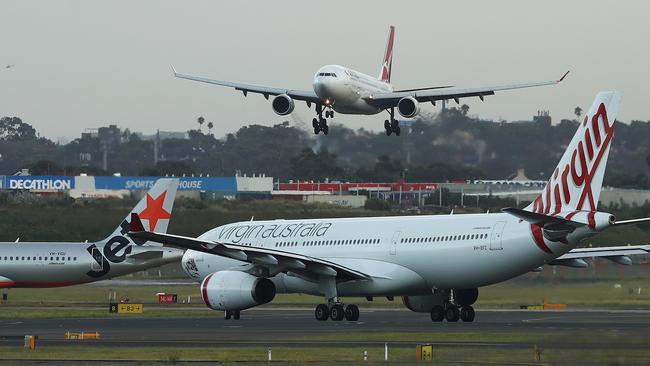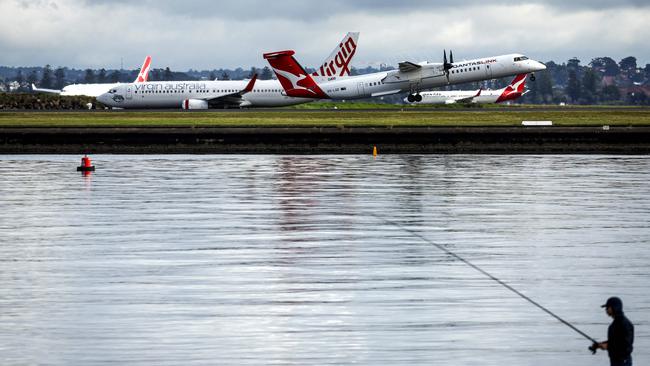Aviation white paper zeros in on airline performance and competition
The government will review its own travel policies and take a tougher approach to Sydney airport slots, in a campaign to promote more competition in the domestic airline industry.

The federal government will review its own travel policies and take a tougher approach to Sydney airport slots, in a multi-pronged campaign to promote more competition in the domestic airline industry.
The long-awaited aviation white paper included 56 initiatives to be adopted by the government, intended to improve the traveller experience, enhance competition and assist the industry towards a more sustainable future.
The 240-page document acknowledged the dominance of the Qantas-Virgin duopoly, and the fact Australian travellers paid more for airfares than those in other countries.
In a bid to increase competition, the government promised to “lower the barrier for entry” for newcomers by enforcing a “use it or lose it” approach to Sydney airport slots, and introducing more transparency around airlines’ and airports’ commercial activities to help identify any anti-competitive practices.
The changes include a “show cause” reporting requirement for airlines for delayed and cancelled flights to help travellers make choices and incentivise carriers to address the sources of delays within their control.
A review of government travel purchasing policies would be conducted by the Department of Finance this year, to consider whether changed policy settings could better support competition.
“Some white paper submissions suggested that government travel policies may not include adequate protections to prevent government employees from preferencing certain airlines when booking travel,” the document said. “This could have negative implications for airline competition.”
Transport Minister Catherine King said the “centrepiece” of the white paper was an independent Aviation Industry Ombuds Scheme and a Charter of Customer Rights.
The aviation ombudsman would be industry-funded, and based on the Telecommunications Industry Ombudsman with the capacity to handle large numbers of complaints and uphold high levels of service.
Ms King said it would be up to the ombudsman to determine whether a refund or compensation should be paid to passengers of flights that were “unreasonably delayed” or cancelled.
“What we all want to see is that customers get what they pay for,” Ms King said. “You’ve bought a ticket. If the flight doesn’t go or the flight doesn’t go when you expect it to go, you should expect that that’s the service that is provided.
“This is about providing remedies to consumers who have found it very difficult to pursue these issues, and also getting continuous improvement in our airlines and our airports.”

Reaction to the report was largely positive, led by Airlines for Australia and New Zealand chairman Graeme Samuel, who predicted it would end the “political slander” of Qantas and Virgin Australia.
Professor Samuel said initiatives requiring airlines to explain flight delays and cancellations, and greater transparency around Sydney airport slots, would vindicate the two major domestic carriers, which have been accused of slot hoarding.
“It’s terribly important because there’s been what I call airline slander going on, both in politics and outside of it,” Professor Samuel said. “There’s no nonsense in this report, there’s no politicking, there’s no airline slander going on.
“It’s a balanced report that deals with all the issues that ought to be dealt with and the airlines will respond appropriately with support for the report.”
Qantas and Virgin Australia both indicated they would have more to say about the report in coming days, and welcomed the focus on customers and the “long-term vision for aviation”.
New aviation-specific disability standards would be created to improve accessibility of airlines and airports, and there would be an increase in maximum compensation for travellers’ whose wheelchairs were lost or damaged in transit.
Melbourne Airport CEO Lorie Argus, said Ms King had taken “some real national leadership” in that space because “we know we can do better with accessibility”.
“We hope that this is an opportunity for us to be best in class for Australia and for the disability sector,” Ms Argus said.
Choice director of campaigns Rosie Thomas said the advocacy group had campaigned for fairer travel rights for years. “We know that making a complaint about an airline is frustrating and often far too slow,” Ms Thomas.
The Australian Services Union and Flight Attendants Association of Australia said they looked forward to working with the government on the white paper initiatives.
Opposition transport spokeswoman Bridget McKenzie described the report as a “wholly inadequate response by the Albanese government”.
“Almost half the recommendations are for new consultations and reviews, there’s nothing for regional aviation, and no reform of Airservices Australia,” Senator McKenzie said.
She said setting up a “complaints box” was not a strategy but an inadequate and wasted opportunity.
“(Ms King) has confirmed Labor has no plans to compensate passengers for delays and cancellations,” Senator McKenzie said.
Her anger was shared by Consumer Champion Adam Glezer, who said the “complete disregard” for an EU-style compensation scheme was “a kick in the teeth to all Australians”.
“What it means is airlines quite simply will not be held accountable for delaying flights and cancelling them at the last minute,” Mr Glezer said.
“The minister said there would be huge improvement for Australians, and that’s completely misleading.”






To join the conversation, please log in. Don't have an account? Register
Join the conversation, you are commenting as Logout